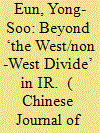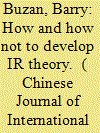|
|
|
Sort Order |
|
|
|
Items / Page
|
|
|
|
|
|
|
| Srl | Item |
| 1 |
ID:
162638


|
|
|
|
|
| Summary/Abstract |
Since the publication a decade ago of Acharya and Buzan’s seminal forum, ‘Why is there no non-Western IR theory?’, voluminous studies have attempted to ameliorate the Western parochialism of international relations (IR) studies. This trend includes a strong and increasing commitment among non-Western (in particular, Chinese) IR scholars to the development of ‘national schools’. However, Acharya and Buzan point out that non-Western IR theory-building enterprise ‘cannot be a conversation among the likeminded’. They add: the project ‘is more likely to fail if it does not draw in the broadest group of scholars, including those in the Western mainstream’. In a related vein, Peter Katzenstein writes that the diversity and heterogeneity of world politics cannot be captured by binary distinctions between Western and non-Western IR theory. Rather, our focus, he notes, should be on interactions between different types of knowledge. In short, we need a two-way ‘dialogue’ across ‘the West/non-West divide’ to transform the current Western-centric IR into a global discipline. A critical question, then, is how we can ensure such a dialogue without descending into a narcissistic turf war. This article tackles the how-question head-on in its discussions of the diverse kinds and properties of dialogue.
|
|
|
|
|
|
|
|
|
|
|
|
|
|
|
|
| 2 |
ID:
162639


|
|
|
|
|
| Summary/Abstract |
As China’s influence in the world economy grows, scholars have become increasingly interested in distinct Chinese traditions of thought relating to the study of international political economy (IPE). While much has been written about historical Confucian ideas about tributary relations, IPE scholars have devoted little attention to another Chinese intellectual tradition that challenged those ideas in the 19th century: Chinese economic nationalism. In the wake of the two Opium Wars, early Chinese economic nationalist thinkers urged Chinese authorities to embrace a new priority of boosting the country’s wealth and power (fuqiang 富强) through an outward-oriented, state-led development strategy. Their ideas shared some similarities with Listian economic nationalism that became popular elsewhere in the world at this time, but they were developed without direct engagement with that Western-originated thought. The indigenous roots of 19th-century Chinese economic nationalism also gave it characteristics that distinguished it in interesting ways from the Western version of economic nationalism in that era. In addition to widening our understandings of Chinese traditions of IPE thought, this study of the distinct content and origins of early Chinese economic nationalism contributes to: recent efforts to overcome the Western-centric foundations of IPE thought, literature exploring the diversity of economic nationalist thought and its diffusion in the 19th century, and analyses of China’s post-1978 foreign economic policy.
|
|
|
|
|
|
|
|
|
|
|
|
|
|
|
|
| 3 |
ID:
162636


|
|
|
|
|
| Summary/Abstract |
This article starts from the fact that there is a substantial gap in terms of International Relations (IR) theory production between the West and the rest. Its aim is to investigate how that gap might be closed, and for this purpose, the article takes a broad view of what counts as theory. Its method is comparative history: to observe how IR theory has developed not just in the West, which is well-studied, but also in the periphery, which is not. The idea is to identify what material conditions and motivations in both locations were associated with the emergence of theoretical thinking about IR, and how and why theoretical differentiations emerged, particularly within the West. It also looks at conditions and circumstances that seem to work against the successful production of IR theory. The article concludes with a brief consideration of IR theory development in China on the basis of the lessons drawn from the history of IR theory development.
|
|
|
|
|
|
|
|
|
|
|
|
|
|
|
|
| 4 |
ID:
162637


|
|
|
|
|
| Summary/Abstract |
This article develops a cultural approach to international theorizing. It argues that a cultural community is the prototype of a community of practice and where, therefore, shared background knowledge plays a significant role in knowledge production and theoretical innovation, because theorists are cultural beings sharing the background of the community in which they live and practice. Social theory, thus, bears the indelible cultural imprints of that community. It correctly aims to be universal but can at best achieve bounded universality. Two cases are used to illustrate the cultural approach: the ‘implicit permeation’ typical of Western (international relations) international relations theories, which are inspired by key elements of Western culture, history, and practice and the ‘explicit penetration’ of Chinese IR theories, which rely explicitly on Chinese cultural resources for information and enlightenment. Three Chinese IR theories—Yan Xuetong’s moral realism, Zhao Tingyang’s Tianxia system, and Qin Yaqing’s relational theory—are discussed as specific examples. The cultural approach is both essential and effective for the development of non-Western IR theories. Taking a pluralistic approach, the article also argues for the recognition of a multiverse of knowledge and for the encouragement of non-Western IR theories to grow and engage Western IR theories in a constructive dialog toward reciprocal empowerment. A significant development upon the discipline’s centenary would, perhaps, be the rise of a truly global IR project whose hallmark is the growth of non-Western IR theories.
|
|
|
|
|
|
|
|
|
|
|
|
|
|
|
|
| 5 |
ID:
162635


|
|
|
|
|
| Summary/Abstract |
This article makes its case against the reliance on binaries that is pervading our analytical and political conceptual universe under a variety of labels—Western vs Non-Western, West vs Rest, and Occident vs. Orient. These reductions are misleading as analytical short-cuts and pernicious as political projects. Theoretical complementarity provides us instead with an opportunity to divide our labor, extend our causal arguments, and show a measure of humility as we advance unavoidably limited theoretical claims. This argument is presented in two steps. In the first section, this article inquires into the distinction between Western and Non-Western International Relations Theory. In the second section, it discusses common knowledge and theories and tacit knowledge and world views. In both sections, the article argues for an approach to the two types of knowledge that is complementary, not binary.
|
|
|
|
|
|
|
|
|
|
|
|
|
|
|
|
|
|
|
|
|